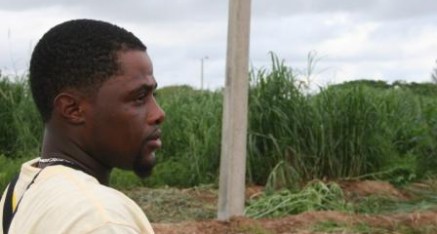Homeless in Miami find new outlet, feeding the well-heeled
Miami sees itself as a model for reducing homelessness; community farm project grows produce for upscale eatery.
By Zachary Fagenson
As part of an innovative effort to tackle Miami's problem with homelessness, Xavier Wright has traded the streets of downtown for a live-in community farm project in south Florida that grows produce for an upscale restaurant.
Wright, 25, said it's his first steady job in two years.
"I love this. I love being outside, I love working with my hands," said Wright, wearing a straw hat to shield himself from Florida's relentless summer sun.
Verde Gardens, a $17.2 million, 145-unit complex built for Miami's formerly homeless, boasts a 22-acre (9-hectare) organic farm planted with a variety of fruits and vegetables from potatoes to bananas and pigeon peas.
Wright, who previously served in the U.S. Marine Corps in Iraq, had resided in a homeless shelter with his 6-year-old autistic son before moving to Verde Gardens.
The farm is tapping into a rising trend in the restaurant industry to use locally grown seasonal products.
Norman Van Aken, a nationally acclaimed chef, has been buying produce from the farm for about six months for his newest eco-friendly restaurant, Tuyo, which sits atop the newly created Miami Culinary Institute in downtown Miami.
With breathtaking views of the city and Biscayne Bay, Tuyo serves a well-heeled crowd, including classical music aficionados who come by after attending performances at the city's opera house and concert hall a few blocks away.
"This should be able to be done in many other places, it's sustainable, it's local and it's organic," Van Aken said as he examined a delivery of Verde Gardens Seminole pumpkins in the kitchen at Tuyo, where they'll be turned into an estofado, a creamy pumpkin soup served with bits of braised chicken, ribbons of ham, corn and topped with fresh shaved truffles.
"It's not a bargain, but it's not more expensive" than other produce, he said.
Wright's job at the farm, an apprenticeship, pays $10 an hour. He will spend eight months with nine other apprentices rotating around the farm's different areas. Once he's done, the hope is that he'll move into a full-time job on another farm.
Wright served one tour with the Marines in Iraq from 2006 to 2007. He describes himself as "good with computers" but couldn't find a job that suited him.
A better fit for Wright was moving into the live-work community in Homestead, sandwiched between Miami's growing metropolis and the more laid-back Florida Keys.
The apartments and support services were developed by Carrfour Supportive Housing, a nonprofit real estate company funded by a local homeless trust as well as the federal and state governments.
THE TIDE OF HOMELESSNESS
Carrfour sprung from the local Chamber of Commerce to help turn the tide of homelessness. Since starting in the early 1990s, Carrfour has collected about $200 million to build 1,378 affordable housing units. Rent for each unit is a flat 30 percent of residents' monthly income.
At Verde Gardens there's a playground for the children and a farmers' market where residents can sell produce and other cottage-industry products. Most important for Wright is a nearby school that gives his autistic son, Xavier Jr., 6, the help he needs.
Miami sees itself as a model for reducing homelessness. City officials from Austin, Texas, visited last month to see what's been done to reduce the number from more than 8,000 living on the streets a decade ago to fewer than 1,000 today.
A model similar to Verde Gardens is also taking root in Chicago, where Growing Home Inc is looking to move people out of the cycle of homelessness by offering paid internships on one of three urban farms.
One of the keys to solving the problem was creating a tax to fund potential solutions, said Ron Book, head of the Homeless Trust and one of Florida's best-known lobbyists.
"If you don't have plans for formerly homeless people, if you don't find places to employ them, then what have you really done?" he asked.
For more than two decades, Book has earned a reputation as the go-to guy to get legislative action in Tallahassee, and he's just as effective in the homeless arena. In between discussing the trust's ongoing projects he's bellowing into a cell phone and demanding to know why he saw only one jungle gym on the children's playground.
Meanwhile, Xavier Wright says he found exactly what he's looking for in a job, and is also taking a design class in sustainable living to prepare for his next career move.
"If you give me a job in front of a computer in the air conditioning I'll go crazy," he said. "I'm starting a fumigation company that will focus on the whole organic side of the business."
SEP

